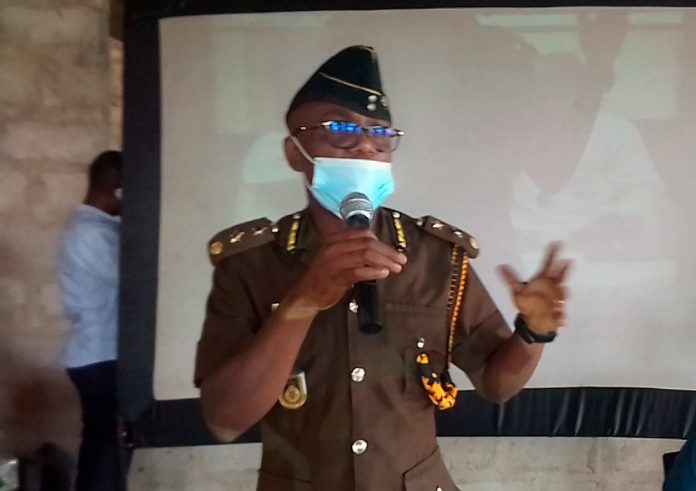The Winneba Prison Commander, ADP Peter Afari Mintah has lamented over the poor state of prisons across the country.
According to him, the Ghana Prisons Service is the most neglected security agency in Ghana even though it plays a very important role in the delivery of justice in the country.
Speaking at a sensitisation workshop for vagrants in the Effutu Municipality in the Central Region, ADP Afari Mintah, blamed the situation on the low-value Ghanaians place on the Prison sector.
He added that the status quo is disappointing because this institution is critical to the development and transformation of inmates.
“When armed policemen arrest notorious criminals they spend a maximum of 48 hours in their custody but after such people are taken to court and sentenced to 10, 15, 20 years or more, it is the weaponless prisons officers who keep such dangerous criminals until their release but when comes to matters of the prisons very few people talk for better conditions of service for prison officers and for that matter getting state of the art equipment to develop the sector,” the Winneba Prisons Commander lamented.
“The bad perception about prisoners generally and poor infrastructure is making prions management difficult. Even with the GHC1.80 feeding a day per prisoner, realistically, it is around GHC1.10 pesewas as the money is given to contractors who also take their profits from that amount. So if he is supposed to supply food items worth GHC1.80 at the end of the day he will be able to supply about GHC1.10,” ADP Afari Mintah disclosed.
Ghana’s prisons system is undoubtedly one of the most deplorable in Africa as majority of all the prisons in Ghana were handed over by colonial masters that were primarily not meant for humans.
The prison inmates who are packed like sardines usually live in inhumane conditions as the prisons are overpopulated.
Nsawam Prison for instance is meant to house up to 700 inmates but currently, has over 4,000 of them living there. As a result of the shameful situation across the country, an NGO, Crime Check Foundation (CCF) in partnership with the Open Society Initiative for West Africa (OSIWA) have begun a sensitisation programme named; Decriminalizing Vagrancy Laws And Advocacy (DVLA) to help decongest the prisons.
The DVLA Project Consultant, Cosmos Akorli during an address at the workshop with vagrants in Winneba at the Municipal Assembly explained that the project aims at educating the poor on assembly by-laws to reduce the rate at which petty offenders get jailed for breaking the laws due to their economic conditions.
It is also increasing citizens’ knowledge on the bye-laws of the MMDAs and other relevant penal codes to reduce violations, arrests, fines, and imprisonment of citizens under the laws.
When achieved, the objective will foster an enabling environment for vagrants; consisting of the homeless, street hawkers, head porters, vendors, truck pushers, market women, artisans, and other identifiable and vulnerable groups to know, claim and exercise their rights and responsibilities in Ghana.
Non-Custodial Law
Besides, the CCF and OSIWA are also calling on the government to put in place a non-custodial law that will allow such offenders to offer community service instead of being jailed at the expense of the taxpayer.
In view of the DVLA project objectives, the Winneba Prison Commander, ADP Peter Afari Mintah welcomed the move, saying the enactment of a non-custodial law will drastically reduce the huge numbers at the prisons particularly petty offenders and suspects who are kept on remand for years.
“There are non-custodial sentencing laws in other jurisdictions, such as probation, community services; if this happens the prisons will be decongested as there are lots of inmates whose offences are minor; it will also lessen the burden on the national purse.
ADP Peter Afari Mintah also commended the Crime Check Foundation saying the NGO has been very instrumental in the reintegration of ex-convicts into society.
The Prison Commander further took the vagrants through the prison system in Ghana stating that they’re unfit for purpose. He, therefore, cautioned them against flouting the laws as “everyone is a potential prisoner.”
He also appealed to corporate bodies and philanthropists to come to the aid of the agency.
8th Parliament To Pass Non-Custodial Sentencing Bill
Meanwhile, the Attorney General, Godfred Dame in May this year gave an assurance government is in the process of enacting a non-custodial sentencing law and was positive the bill will be passed into law before the current Parliament expires.
Ghanareport quoted Mr Dame saying “we first have to seek policy approval for the enactment of a law and when the approval is given, we have to come back to draft it. After drafting, we have to submit it for stakeholder consultation, and that process is very long. It is time-consuming and resource-intensive as well.”“After the stakeholder consultation, we will submit it to the cabinet.
Cabinet will also consider the bill and changes will be made before the Attorney General forwards it to Parliament for consideration and passage. We are therefore working on the passage of a Community Sentencing law,” he was quoted to have said.
Participants at the workshop consisted of representatives of traditional authorities, market traders, truck pushers, sanitation workers, the local chapter of the Federation of Disability Organizations, and other identifiable groups.
About The Project
The one-year project is being rolled out in 12 metropolitan assemblies in three regions: Greater Accra, Ashanti, and Central.
It has already sensitized 1200 vagrants about their rights and responsibilities to prevent any misunderstandings with the assemblies.
Monitoring and Evaluation
To monitor the progress and effectiveness of the Decriminalizing Vagrancy Laws and Advocacy project, a contact centre has been created after the sensitization to address the concerns of vagrants at the partnering organization, Crime Check Foundation.
The project started in May 2021 and is expected to end in May 2022.
By Sefakor Fekpe
]]>










